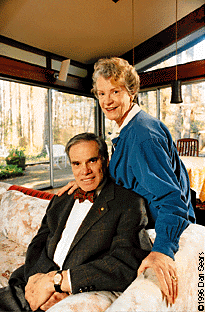
Born in 1925, Rodbell lived above his father's small grocery store in Baltimore. "I worked in the store when I was old enough, filling shelves, writing orders and delivering groceries with my little red wagon," Rodbell recalls. His parents were not intellectuals and had never attended college, but they instilled in him a yearning for knowledge, he says, and a respect for teachers.
At school, "Marty was not a teacher's pet and he wasn't a grunge, but he was regarded as one of the smart kids," recalls Rodbell's childhood friend, Neal Zierler. "He was just a great kid, a warm and charming fellow."
Rodbell, Zierler and a third friend, Angus McDonald, gradually became interested in science and math. Rodbell couldn't have a chemistry set in the basement--it was the storeroom for the grocery shop. "Neal had all the equipment," he says. "We used to try to blow up things and watch mixtures change colors in his basement sink."
"Angus and I were very interested in math and science, Marty less so," Zierler recalls. "Maybe it rubbed off a little bit on him."
In junior high, a math teacher took a liking to the threesome. "Mr. Lundberg knew the three of us could do algebra. He had us come in after class every day and gave us lists of algebraic problems to do," Rodbell remembers. "The three of us weren't that competitive. We just enjoyed doing those problems."
The three attended a boys-only, public high school patterned after Eastern prep schools. There was a great emphasis on languages and hardly any science--there wasn't even a physics course. Rodbell was torn between his love of languages--especially French--and his love of science.
"There were economic and cultural pressures that prevented me from going into French," Rodbell says. "My father probably would have kicked me out of the house if I had told him I was going to be a French professor. It was always, `Why don't you become a doctor?' "
That decision had to be delayed anyway. In 1943, Rodbell enrolled at Johns Hopkins as a sophomore, thanks to high school work that was worth almost two years of college. But he got his draft notice soon after he turned 18. "They realized because of my eyesight I should not be put on active duty. Anyone who saw me on a firing range said, `That guy shouldn't have a gun in his hands,' " Rodbell recalls.
Being a Jew, he felt the first priority was to fight Hitler. But the Navy sent him to the Pacific instead. He graduated at the top of his class in radio school and thought he would have a cushy job aboard a ship or in the rear lines.
"Instead I was posted to the Marines. I was loaded with radio equipment--it must have weighted 100 pounds on my back--and told I was going in on the second or third wave."
He was part of a landing in the Philippines, not under direct fire from the Japanese, but in a dangerous place. "I can tell you it was pretty scary to be in the middle of a jungle, especially for someone coming from Baltimore," he says.
In that jungle he got malaria and after his recovery spent the rest of the war in ships' radio rooms. Like most World War Il veterans, it was experience that changed his world view. "It had an enormous impact on me. We were a collection of people from all walks of like and backgrounds. There was a real sense of comradeship," he says.
At the war's end his ship docked in Seattle, where he spent a month before he was discharged. "I spent time in California too. I found that I really liked the West." He kept those impressions in mind when he returned to Johns Hopkins.
His family still wanted him to be a doctor, so Rodbell started in pre-med. But he found the atmosphere too competitive. "I wasn't so easy to get in, especially if you were a Jew," he says. A turning point was a class in biology that set his course in biological research instead of a medical practice. A professor told him to specialize in biochemistry and he spent an extra year at Hopkins taking every advanced chemistry course available.

Barbara Lederman survived the war in the Dutch underground, but lost her family to the Holocaust. After the war, Anne Frank's father, Otto, offered to take care of her. "Barbara was too old for that; she wanted to get on with her own life," Rodbell says, so she left for America. She remained in touch with Otto Frank until his death. Her memories of the Frank family and the Amsterdam Jewish community are preserved in the archives of the U.S. Holocaust Memorial Museum in Washington D.C.
At the time she met Rodbell, Barbara was selling hairbrushes in a department store and acting in a drama group at Hopkins. "She had to fill in at the last moment in Moliere's School for Wives, and she was wonderful," Rodbell recalls.
Others thought she was wonderful too, especially one of Rodbell's fraternity brothers, who started dating her. But then the fraternity brother had to leave for graduate school, so he asked Rodbell to "keep an eye on" his girlfriend. "I looked in on her and found her in bed, terribly ill. She couldn't get up. My mother made a big pot of chicken soup and I spoon-fed her. I had to nurse her back to health," Rodbell says.
The romance blossomed. Barbara was a cultured European, accomplished in acting and ballet. Through her, Rodbell's world expanded to include the performing arts.
The UW Years--In the Lab and on the Stage
The Breakthrough that Led to the Prize
Later Years and the Day of the Award
Science Brief:
Turning It On: How G
Proteins Communicate in the Cell
Return to Rodbell Opening Page